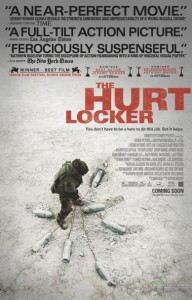Film Review: The Hurt Locker
 History was made last week when a female finally took home the Oscar for Best Director – a category, which for the first time, also included an African American male nominee. I was quite surprised when I realised that for the past 82 years a white male has always taken home the Best Director Award. Winner Katherine Bigelow (ex-wife of James Cameron who was also nominated) directed the war film The Hurt Locker, which also won Best Picture.
History was made last week when a female finally took home the Oscar for Best Director – a category, which for the first time, also included an African American male nominee. I was quite surprised when I realised that for the past 82 years a white male has always taken home the Best Director Award. Winner Katherine Bigelow (ex-wife of James Cameron who was also nominated) directed the war film The Hurt Locker, which also won Best Picture.
The film follows a small team of American specialists who diffuse bombs in Iraq, and while I am not generally a war film fan (with the exception of Apocalypse Now, of course) The Hurt Locker will certainly be appreciated by many.
A documentary feel is felt throughout, creating a sense of realism, and the opening is dominated by rigid close up shots and unstable camerawork, as Australia’s Guy Pearce makes a cameo appearance. The explosion scenes in the film are very well done, and viewers can at times feel the vibrations in their seats. The core of the film however, is very intense – it focuses on the life threatening work these men are required to undertake and the tensions that develop within the team, as personalities clash.
Will James, played by Jeremy Renner certainly deserved his Oscar nomination for Best Actor – he portrayed the reckless, yet kind hearted and confused Staff Sergeant very convincingly. His befriending of a young Iraqi boy brings humour to the film, and his care for the well-being of his team members is highlighted in the scene when they are under fire and surrounded by dead soldiers, and James manages to console Eldridge who is in the midst of a panic attack, and then makes sure Sanborn is not dehydrated. His behaviour however, is proven to be somewhat contradictory in many scenes throughout the film, especially when Eldridge blames James for shooting him in the leg, due to his unorthodox orders.
The film is very much an American war film in that the Americans are certainly cast as the heroes, however the film’s message is left unclear in the end. The doctor in the film at one point naively mentions that “war can be fun”; and the film begins with a quote stating that “The rush of battle is a potent and often lethal addiction, for war is a drug” – a drug which James appears to be addicted to.

